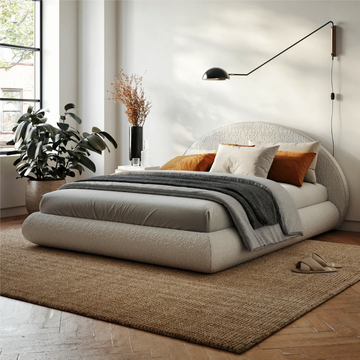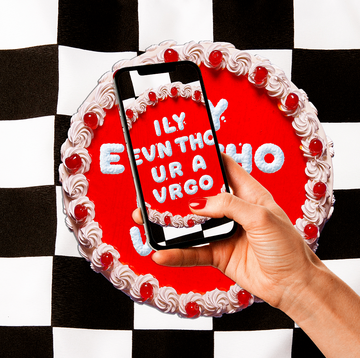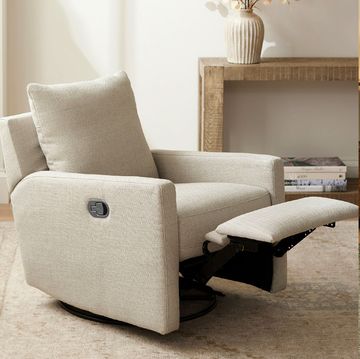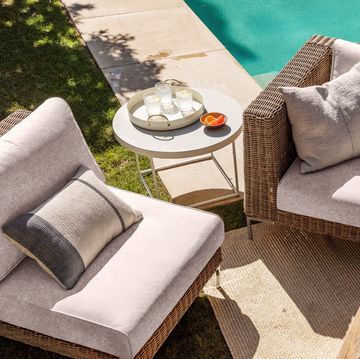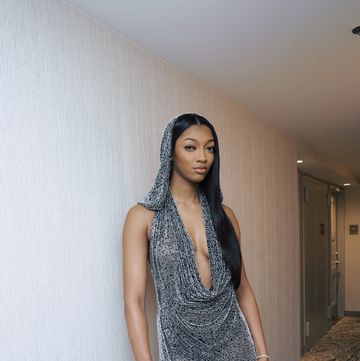When Nana Meriwether entered the Miss USA competition in 2012, she had to give up her privacy, her cell phone, and her name. For three weeks, she lived in a hotel with the other contestants, spent 15 hours a day on call, and only answered to "Maryland."
She came in second in the competition, went home, and resumed a normal life. Then, six months later, when Miss USA Olivia Culpo won the Miss Universe title, Meriwether went back to the schedules and the chaperones. But this time she had a new name: Miss USA. Meriwether, now 29, tells Cosmopolitan.com the daily grind of being pageant royalty.
There are two things I love about winning: striving to achieve a goal and the adrenaline rush I get out of competing. Growing up in Maryland, I started playing competitive volleyball when I was in eighth grade. I played all through high school and I eventually went on to become a two-time NCAA All-American for UCLA. I was even invited to train in Colorado Springs for the 2008 Olympic Games after playing professionally in Puerto Rico for six months. When I finally retired from sports, I missed having a physical and mental goal everyday to aspire to. So in 2006, while I was studying for the MCAT and post-graduate premedical sciences at USC, a friend suggested I compete for Miss California USA — I decided to give it a try.
Coming from a background of athletics, it seemed odd to enter a pageant to satisfy my competitive fix. It was so out of character for me, I didn't tell anyone I was competing. I think I called my mom to mention it only the day before. I didn't place in the semifinals my first time, so I entered again the next year and placed as third runner-up. In 2010, I was first runner-up and in 2011, I was fourth runner-up. California is the most competitive state. In total, I tried for six years and was about to give up on the whole thing, but when I finished college and moved back home to Maryland, I decided to try one more time and entered the Miss Maryland USA competition.
The pageant in Maryland is quite different than California. There are fewer girls, it's less fashion-obsessed, and there are more diverse women. But I didn't approach it as being easier. I actually worked harder. It's still a competition after all. But I wanted to make my home state proud, so I strived to do that, which is why I think I won.
From there, it was on to the Miss USA competition. The only way I knew how to prepare for something like this was from my experience in sports. I focused a lot on the physical aspect — I worked out, ate really clean, and tried to stay focused on the goal. It's a three-week competition where you're completely immersed in this world and everyone puts their lives on hold for those weeks. My peers included lawyers, dentists, and girls in school — it was hard, but we all just pushed pause on our lives to give this competition our all.
I took a half year off before the competition started and was in the gym four hours a day. I filled my schedule with events in order to get used to the lifestyle of Miss USA and even booked a trip to South Africa to do a press tour for my foundation, the Meriwether Foundation. It's a once-in-a-lifetime opportunity to give light to a platform, so the ambitious entrepreneur in me took full advantage.
When I finally arrived at the Miss USA pageant in Las Vegas, the first thing they did was change our names by giving us a sash with our state name on it that was to be worn at all times. I suppose in the hustle it was easier for staff to move us around that way, so from the minute I checked into the hotel, my name changed to "Maryland." We would even address each other by state name and say, "Hey, New Jersey, want to get a drink with me?"
The first week of competition was based on publicizing the host city and impending competition, so we were all running around town with the press and media, visiting shows, restaurants, and various events. The following weeks of this almost-month-long competition were focused on rehearsal. Besides the World Cup and the Olympics, the Miss USA and Miss Universe competitions are some of the most-watched television events worldwide, pulling in over a billion viewers worldwide collectively. As a result, we were subjected to full-day rehearsals till every move and step was perfect for the live show.
When we weren't rehearsing or out at press events or interviews, we were in the hotel, which we weren't allowed to leave unless we had a scheduled event. My room was on a single floor of the hotel shared by the 51 other girls. During this whole process, I had to carry around two cell phones, the one I already owned and the one the pageant gave me, and if the pageant's phone rang, I always had to answer it. I also wasn't allowed to see friends or family, so many of my relationships suffered because of the competition. I missed my best friend's bachelorette party in Cabo, and it drastically changed things between us. I also had no control over my schedule, and that was hard for people to understand.
The days leading up to the Miss USA pageant usually started at 7 a.m., so in order to get a workout in, I'd have to get up around 4 a.m. to also have enough time to get hair and makeup ready — since hair and makeup took at least an hour each day, I had to factor that in to manage my time properly. The first week there, everyone was working out, but by the last few days of the competition, there were only three of us left: me, Rhode Island, and Ohio, and funny enough, we ended up being the top three final contestants onstage on finals night. I think it had everything to do with our mental strength.
Contestants also couldn't visit the gym downstairs without a security escort, so you would oftentimes see girls working out and running the hallways of our private floor. After three weeks of being under constant supervision, surrounded by really ambitious, hungry, and driven women, a lot of women broke down. They hid it fairly well during competition, but the stress showed afterward. There were even some girls who bad-mouthed the Miss Universe organization or other contestants, complaining that the results were fixed. Whether the stress manifested during competition or in the months after leaving the Miss USA pageant, I think most every contestant endured some sort of stress and hit a wall.
You don't realize when you're competing what a machine it is and the amount of energy it takes. I think if women knew what the Miss USA pageant requires before they enter the competition, 90 percent wouldn't compete. The training is intense. I was coached on how to speak, what to wear, and how to wear it. I spent 12-hour days rehearsing in a ballroom to learn how to walk like Miss USA. It was like boot camp. Our teacher told us, "Walk like there are two people in the world: someone who wants to be you and someone who wants to marry you." Sometimes now, if I'm in the grocery store, I'll turn that walk on and strut down the canned soup aisle just for fun.
By the time the pageant rolled around, everyone was so tired. It was stressful. It was lonely. Paranoia was running high. Contestants would begin to read into little things to try to figure out where they stood in the competition. We'd wonder among ourselves if a state was doing better than another based on ridiculous gestures, like if a staff member said "Hi" to someone, but not someone else.
To stay clear of the harmful and distracting gossip, I meditated a lot and I really focused on becoming Miss USA, so much so that I truly felt I was her because I visualized living the title and being her. I had to sense that I could embody this woman, so when the winner was announced and I wasn't called, something inside said, "That's OK. Something will come of this." I hugged my parents, went to eat some pizza, and decided to officially move to New York City.
On Dec. 19, 2012, my life changed. A Miss USA pageant winner hadn't won the title of Miss Universe in 15 years until that day. I received a phone call requesting that I, second in line to the title of Miss USA, assume the role immediately. I dropped everything, left my job, my roommate, my apartment, all to start a new life.
I immediately moved into an apartment with Miss Universe and Miss Teen USA, where we had a housemother who took care of us and made sure we were up on time and home by curfew. She was in charge of my entire home life, while I had a manager who was in charge of my schedule. It was a little weird being a grown woman of 28 who had lived on her own in New York City, but was now forced to answer to guardians.
But, it all comes with the job that is Miss USA. You get a salary and work as the brand of the Miss Universe Organization and you are expected to look your best, always. There are stylists, publicists, trainers, nutritionists, lawyers all working for the brand of Miss USA — there's practically a whole village running this thing, and the organization takes every detail very seriously. For example, I never had a say in what I wore, and if I didn't wear a jacket exactly the way a stylist instructed me to, I would be pulled into an office and get a talking-to.
I think a lot of women think being a pageant winner is about getting their nails done and going to a movie premiere with George Clooney. Being Miss USA involves months of going to charity events, red carpets, premieres, appearances, media interviews, volunteering, charity work, and more interviews, but it's not as glamorous as it seems. Being in the public eye can really be draining. So much so, the organization suggests that every titleholder see a psychiatrist at least twice a month.
I came to see the job as similar to being an elected official. I wasn't out saving the world, but I was out representing something. I had to constantly be mindful of myself 24 hours a day, and that pressure can add up to be a lot. No matter how perfect I represented myself or the title, there were always hateful remarks on the Internet, which is a very brutal, cruel place for any public figure.
The criticism I could have done without, but the networking I was able to do while I was Miss USA I definitely benefitted from. I am now within one degree of separation from anyone I want to contact — world leaders, politicians, celebrities, and artists. A lot of girls win when they are really young, sometimes 19 or 20, and may not understand the power of being in a room with Arianna Huffington or Mayor Bloomberg. But being the oldest Miss USA ever — I was only 27! — gave me the advantage of maturity. I understood the power in the people I met and made sure I kept in touch. With that said, a lot of people think that after winning Miss USA, you're going to get anything you want. In reality, it may crack open the door, but you still have to push it open yourself.
Even though there were challenging times during my time as Miss USA, I loved and appreciated the honor of the title that has only been lived by some 60-plus women before. The only thing I wasn't fond of was the judgment that's inherent in being a pageant winner. The perception of a pageant winner is that she's superficial. Sure, one could say that the Miss USA is the "entire package," but superficial I am not. It was just discouraging to see the only stories that got picked up in the news about me were about the men I may or may not have been dating. What they didn't cover is that I have degrees in political science and pre-med; I was an Olympic-level athlete with the potential to compete in he Games; and most importantly, I run a 501(c)(3) nonprofit organization that operates programs in health, education, nutrition, and development in five countries in southern Africa, which helps over half a million refugees and natives there. There is more to me.




